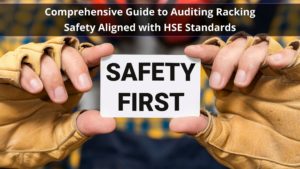
2018 will likely bring many changes to the UK, so racking inspection legislation may have to change with it.
Racking inspection legislation has gone through many changes since the Health and Safety at Work Act 1974 was passed. What started off as a very vague — but very important — workplace safety law became HSE. Today, HSE helps to create legislation and guidance for many specific workplace safety issues. Racking inspection legislation is just one such example of this.
What Is Racking Inspection Legislation?
Racking inspection legislation is a tough thing to define. The most cohesive guide on the topic of how and how often businesses should inspect their racking systems in the UK comes from HSE’s HSG76. The second edition of this guide was published in 2007 and it hasn’t been updated since.
However, HSE’s HSG76 is not legislation in of itself. Rather, it is good practice guidance from HSE. As such, the guide opens with the following caveat:
This guidance is issued by the Health and Safety Executive. Following the guidance is not compulsory and you are free to take other action. But if you do follow the guidance you will normally be doing enough to comply with the law.
In short, while HSG76 may not have changed since 2007, that doesn’t mean that racking inspection legislation hasn’t changed or couldn’t change.
Examples of Racking Inspection Legislation
There are no British laws which were explicitly written to refer to racking inspection, but there are laws which affect racking inspections. In this sense, many pieces of racking inspection legislation have been introduced and have changed over the years.
One of the most important of these is the Provision and Use of Work Equipment Regulations (PUWER) 1998. In January this year, a business in Northampton was fined £330,000 and had to pay damages of over £11,000 after it pleaded guilty to breaching the fifth regulation of PUWER 1998.
This regulation emphasises an employer’s responsibility to make sure that work equipment is inspected after installation and at regular intervals. It’s exactly because of this regulation that businesses are legally required to inspect their racking systems in the same way, as racking systems count as work equipment.
So, Could Racking Inspection Legislation Change in 2018?
It’s possible. What’s more, it’s completely possible for the law to change and for HSE HS76 to stay the same. This is exactly what happened when the CDM Regulations were updated in 2015.
Coming into force just three years ago, these regulations have completely changed the onus of responsibility when it comes to racking inspections. Past CDM Regulations emphasised the importance of competence for employees working in a construction environment.
The issue was that competence — as well as what counted as construction work — was ill-defined by the previous regulations. In 2015, this all changed with the new CDM Regulations, which greatly expanded the legal definition of construction to include warehouses, television studios, and film sets to name a few examples.
What’s more, it is now the legal responsibility of employers to ensure that their employees are competent. It’s also now their legal responsibility to provide a convincing argument for the competence of their employers.
This change in responsibility had the effect of freeing up time and money for HSE, as well as making HSE’s HSG76 more important than ever. Even if the guide itself didn’t change, the fact that it is now an employer’s responsibility to define competence for themselves has led many to fall back on HSE’s advice in this guide.
It’s in this guide that HSE recommends annual racking inspections from SEMA approved racking inspectors (who they label as “experts”). They also recommend regular staff-led racking inspections.
At Storage Equipment Experts, we provide racking inspections from SEMA approved inspectors. We also provide racking inspection training from a SEMA approved racking inspector, so that your staff are competent enough to perform the regular staff-led inspections HSE recommends.
Contact Storage Equipment Experts today for a FREE consultation on racking inspections from SEMA approved inspectors.





